While there’s no official number from YouTube, there are reportedly millions of active channels on the platform.
That might seem like a staggering number of YouTubers to compete with. But the good news: YouTube has more than two billion monthly active users — so there are plenty of subscribers to go around.
The trick is reaching them — and then creating high-quality content that resonates so much with them that they hit subscribe. Easier said than done, of course. But there are plenty of simple tactics you can use to increase your chances of growing on YouTube.
In this article, I’ll share strategies (many recommended by successful YouTubers) that will help you reach a wider audience and convert that audience into YouTube subscribers.
Here are 12 ways to get more subscribers on YouTube.
Jump to a section:
1. Optimize your channel
Let's start with the fundamentals. Even if you create a stand-out video, viewers who click over to your channel page and see gaps and an unprofessional profile will think twice about subscribing. It’s best to leave no stone unturned when it comes to customizing your YouTube Channel.
There are several areas you’ll want to pay attention to when it comes to setting your YouTube Channel up for success. You’re able to tweak this all in YouTube Studio (the tool all YouTubers must use to upload videos and manage their channels) under the Customization tab
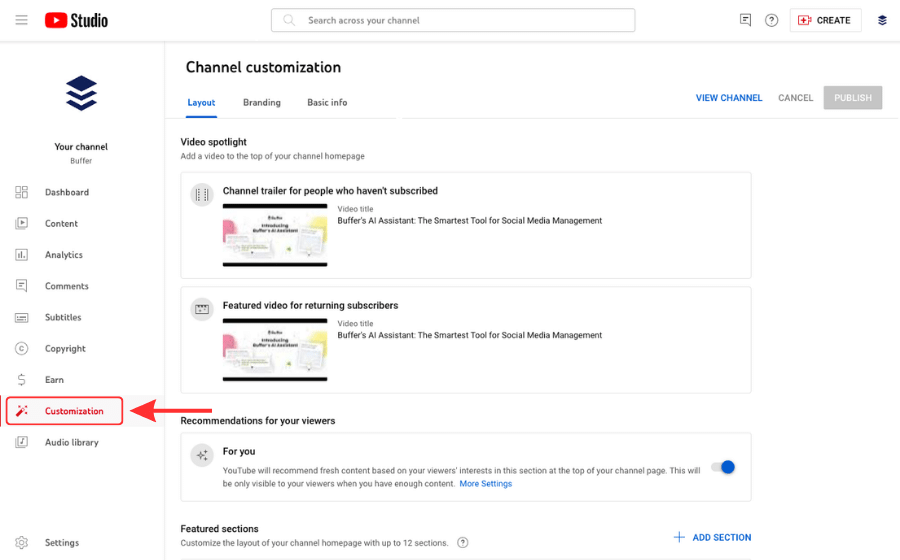
Channel art
I’m going to start with the Branding section (the second tab) since this is where you’ll find the non-negotiables when it comes to your channel.
- Your profile picture: Use a high-res photo of your face if you’re a creator or a logo if you’re a brand.
- Your banner image: Cover art that will appear atop your channel. YouTube recommends an image that’s 2048 x 1152 pixels and 6MB or less.
- Video watermark: This 150 x 150-pixel image will appear on your videos in the right-hand corner for a duration of your choosing. It’s also clickable, so users can subscribe to your channel right from the video.
Channel description
Under the Basic info tab in YouTube Studio, you can edit your YouTube channel name and handle, but the section I want to focus on is your description. What you include here could be a deciding factor when a user looks at your channel to figure out if they will follow you.
While you don’t need to write an essay, be sure to include:
- Who you are
- What your channel is about
- A call to action (CTA) or a reason YouTube users should subscribe
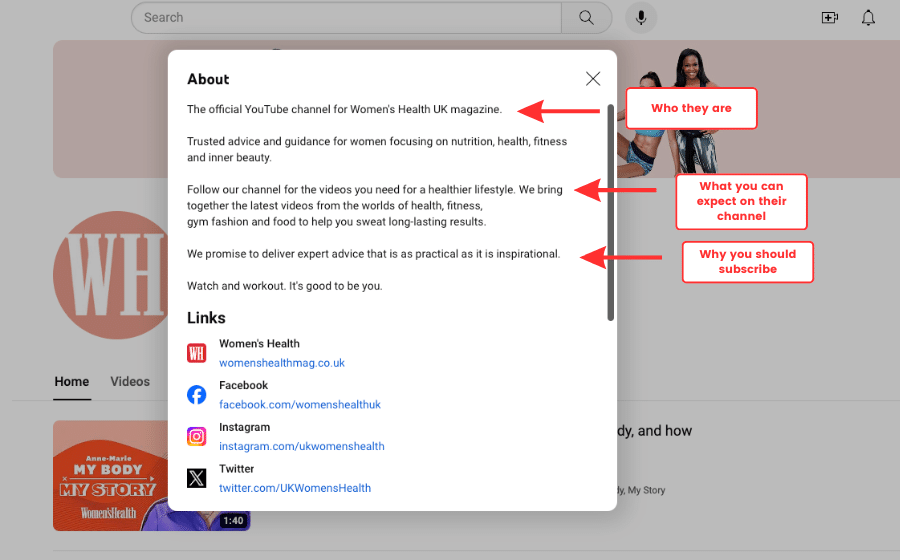
You’ll also want to include a few key search terms here — but we’ll unpack that a little more under number three: YouTube SEO.
Video spotlight
Under the Layout tab, you’ll find two video spotlight options: a channel trailer for people who haven’t yet subscribed and a featured video for returning subscribers.
Spotlighting a new video is an excellent idea for people who have already subscribed — they’re likely revisiting your channel to see what’s new, after all.
But you want to pay more attention to your channel trailer — this could be another make-or-break factor for viewers interested in subscribing. YouTube recommends a quick video that includes:
- What you create
- What your viewers can expect from your channel
- Why viewers should subscribe
Featured sections
Featured sections, also under the Layout tab, allow you to customize what viewers see when they look at your channel homepage. By default, they’ll see a selection of your latest playlists, most recent uploads, live streams, and popular videos.
However, it’s worthwhile giving them a more curated experience to encourage visitors to your channel to subscribe. Some YouTubers will create a ‘Start here’ playlist to help new viewers get the lay of the land. Others will put their best foot forward by showcasing their most popular videos. It’s worth experimenting here to see if a certain layout converts viewers to channel subscribers more than others.
2. Experiment to find your niche
In many guides to growing on YouTube, you’ll find pinpointing your niche as one of the first pieces of advice. And while this is a good starting point, I find it lacks the nuance required for YouTube beginners, in particular.
Sure, digging into a particular niche can be immensely powerful for YouTube success. Just ask Paul O’Malley, who hit the nail on the head right from the get-go with his videos on quick tips to improve efficiency, growing to 30K YouTube subscribers in just six months.
Paul is one of the lucky ones — not all YouTube beginners will have the luxury of a) having a crystal-clear content niche and b) finding it resonates with your target audience just as it is.
YouTuber Ali Abdaal has a great analogy for this. When it comes to finding your niche, you’ll likely fall into one of two categories, he says:
- Architect: Has a fully fleshed-out niche and video marketing strategy planned in advance.
- Archaeologist: Experiments with different ideas and topics until they find one worth digging into (literally).
While being an architect might sound preferable, it’s not really realistic if you’re new to YouTube, says Ali, a tools and productivity YouTuber.
“By exploring enough hot zones, just like an archaeologist, you’ll keep digging until, ‘Oh, hello, there’s something here!’” Ali explains.
Ali puts himself firmly in this category — he started out on YouTube sharing clips of him playing guitar and singing, then snippets of his life as a Cambridge medical student, until finally finding a niche worth excavating: study tips for busy students. This led him to his current niche — and more than 5 million subscribers.
There’s another important lesson here when it comes to niches: don’t be afraid to pivot. YouTuber Aprilynne Alter got her start in a similar way to Ali. After kicking off her channel with a more general assortment of videos, she eventually shared one on NFTs, which blew up — so she leaned in.
“Suddenly, I had to decide: Do I ride this NFT wave or stick to my original, more general content?” the YouTube creator previously told Buffer. Ride the wave she did, and it sent her video content skyrocketing. Her previously slow-growing generalist channel grew to more than 20K subscribers in a few months.
The problem? It wasn’t sustainable. “The thing about niching down is that it's a double-edged sword. On the one hand, it helps you grow quickly. YouTube's algorithm loves it when it can easily categorize your audience. But on the flip side, if you're not passionate about that niche, you're setting yourself up for burnout. That's what happened to me with NFTs. I was creating the kind of content I didn't care about just to ride the popularity wave. Six months in, I couldn't stand the sight of the word ‘NFT.’”
Aprilynne took a break from YouTube to reassess her interests and skills, and she realized she loved the process of making YouTube videos and was good at it, so she turned her efforts to the "How to YouTube" niche.
Within nine months, April had surpassed her old channel subscriber count, with 35K new subscribers and counting.
3. Tap into YouTube SEO
Think of YouTube as a massive video search engine that works much like its parent platform, Google.
To get your content as high up in YouTube search rankings as possible, you want to give YouTube as much helpful information as possible: that means using search engine optimization (SEO) keywords in four areas:
- Your channel description
- Video title
- Video description
- The name of your video file
You’ll want to identify a target or primary keyword for specific videos — include that in the video file name, title, and description — then secondary keywords within your description.
When it comes to finding the right keywords to include, plenty of SEO tools will help you uncover the right phrases in your keyword research. Free tools like Google Trends and Answer the Public can help you pinpoint what people are searching for and how.
However, the simplest method here could be to put yourself in searchers’ shoes. What specific questions will your channel and video answer for them? What specific phrases are the most obvious to search for, where your content is the answer?
4. Create scroll-stopping thumbnails
The importance of video thumbnails on YouTube cannot be overstated. Your content could be the most valuable, funny, mind-blowing video ever created, and if the thumbnail is not enticing, you’ll get… crickets.
Ali Abdaal plans his custom thumbnail before creating the video, he revealed. If he can’t come up with an eye-catching thumbnail idea, he won’t even make the video.
Best SEO Companies conducted a fascinating analysis comparing the thumbnails of the 740 most popular videos of 2020 to pinpoint what factors might increase views. While this study might be slightly dated, I still see these tactics used among the most popular YouTubers.
Here’s what they found:
- Faces: 72 percent of the most popular videos featured a human (those with a face averaged 921,000 more views than those without).
- Branding: Videos with a logo or brand within the thumbnail averaged 1.2 million more views than those without.
- Text: 70 percent of thumbnails of the most popular videos included a title or explanatory text somewhere on the image.
- Emotion: Content conveying sadness had the highest average view count (2.3 million), compared to joy and humor (1.5 million) or anger and fear (818,000).
- Vibrancy: 88 percent of thumbnails from the most popular videos were colorful and averaged more views than videos with more muted colors.
Here are some YouTube thumbnail examples from some very different YouTube channels to inspire you. Notice how they tick all of the boxes above.
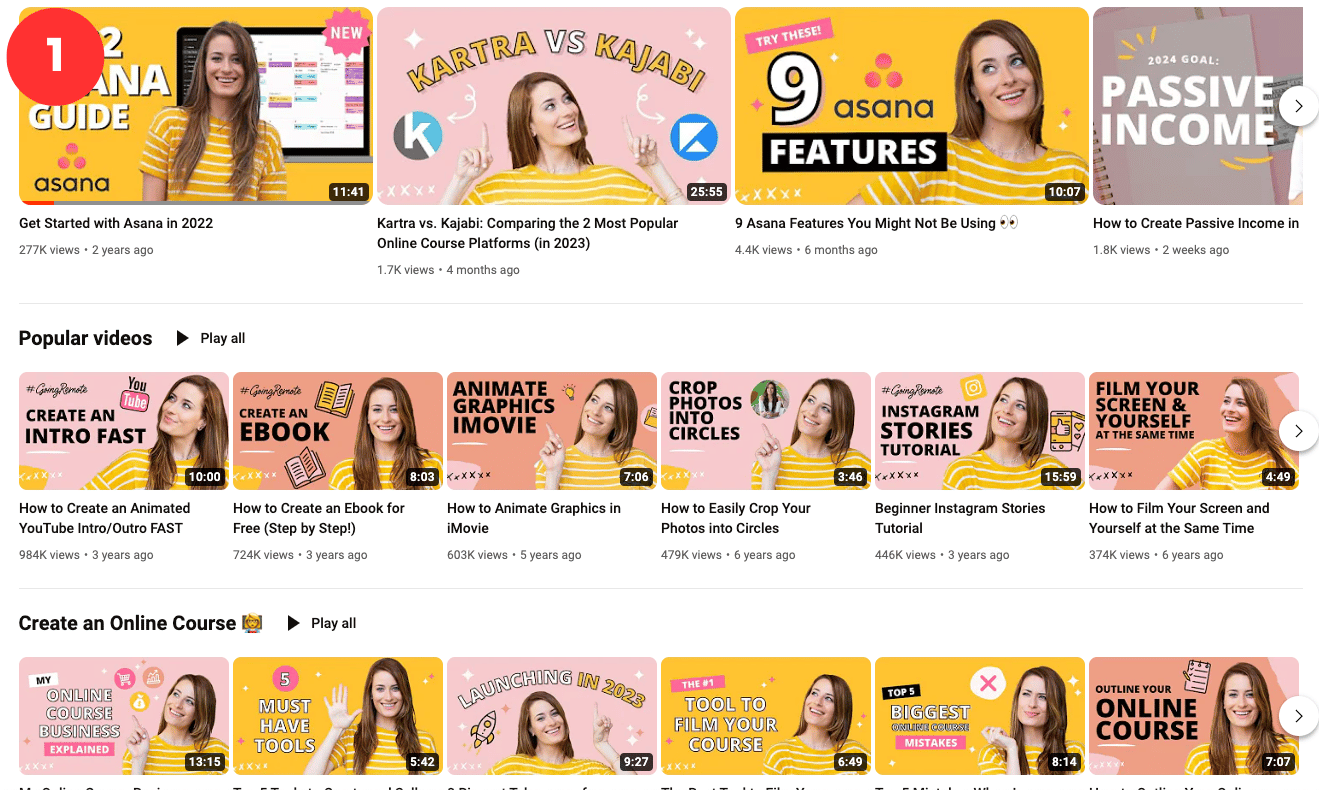
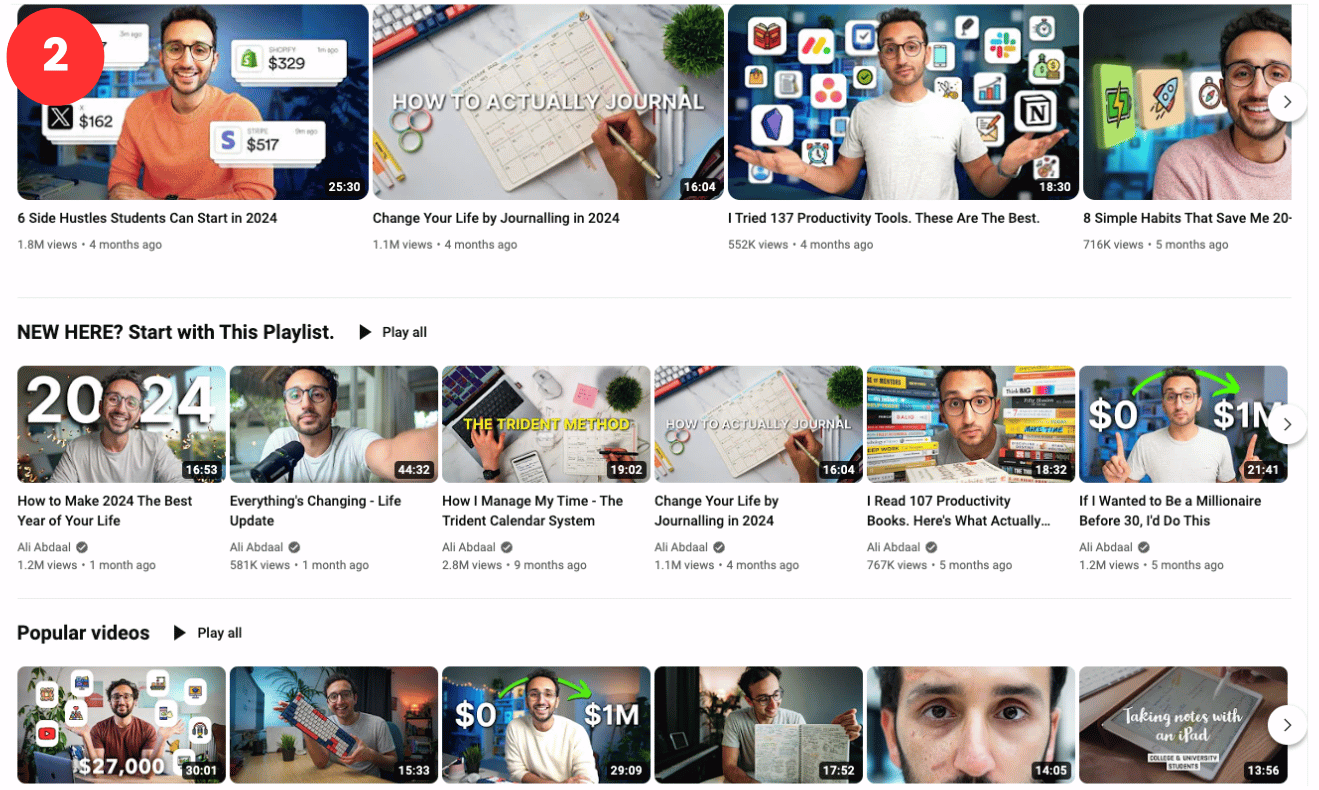
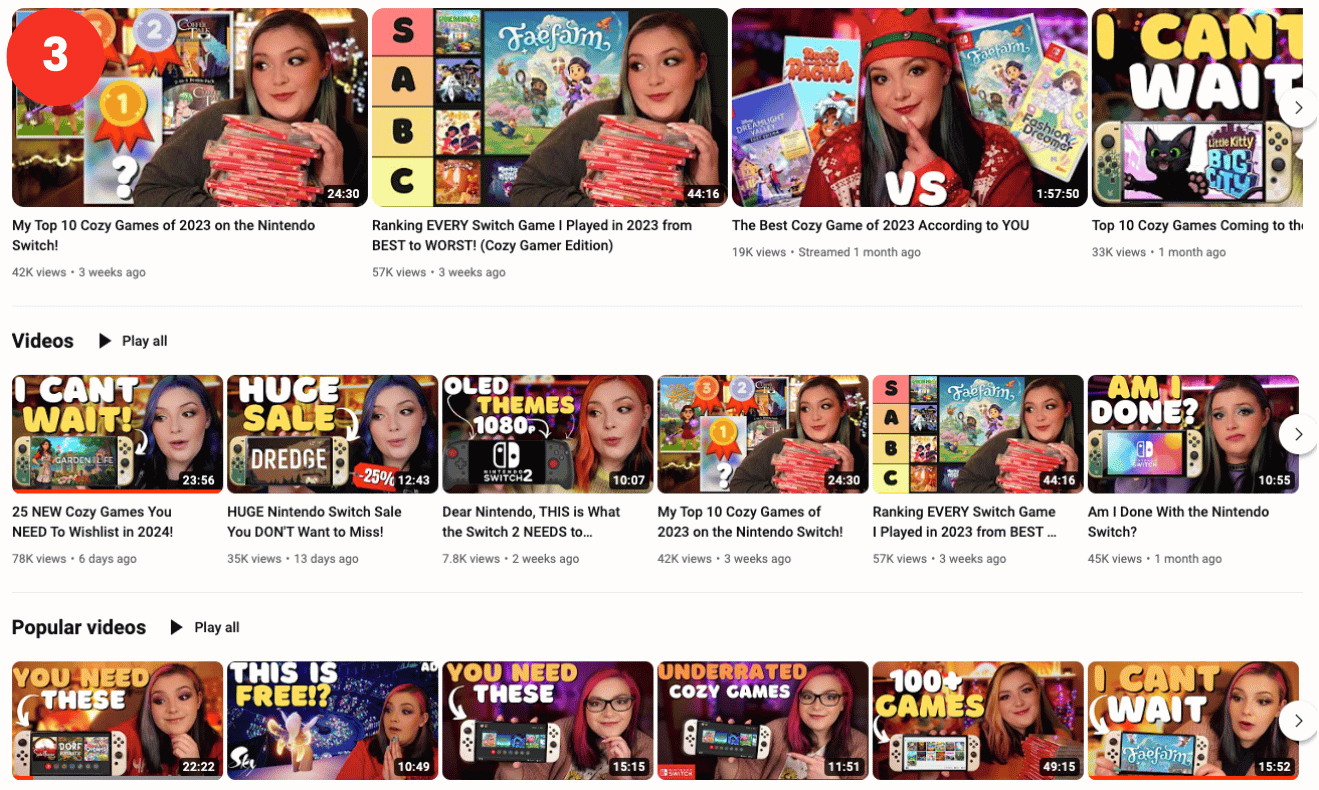
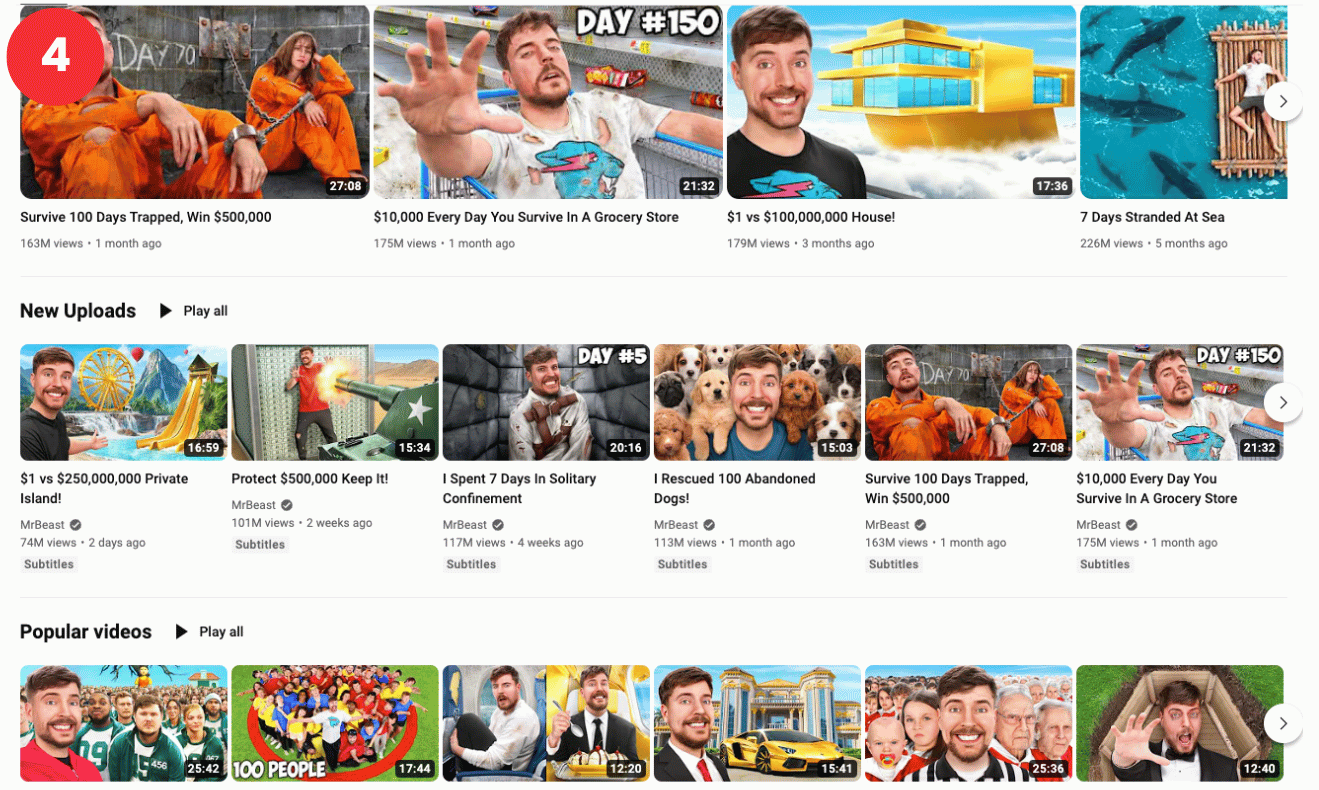
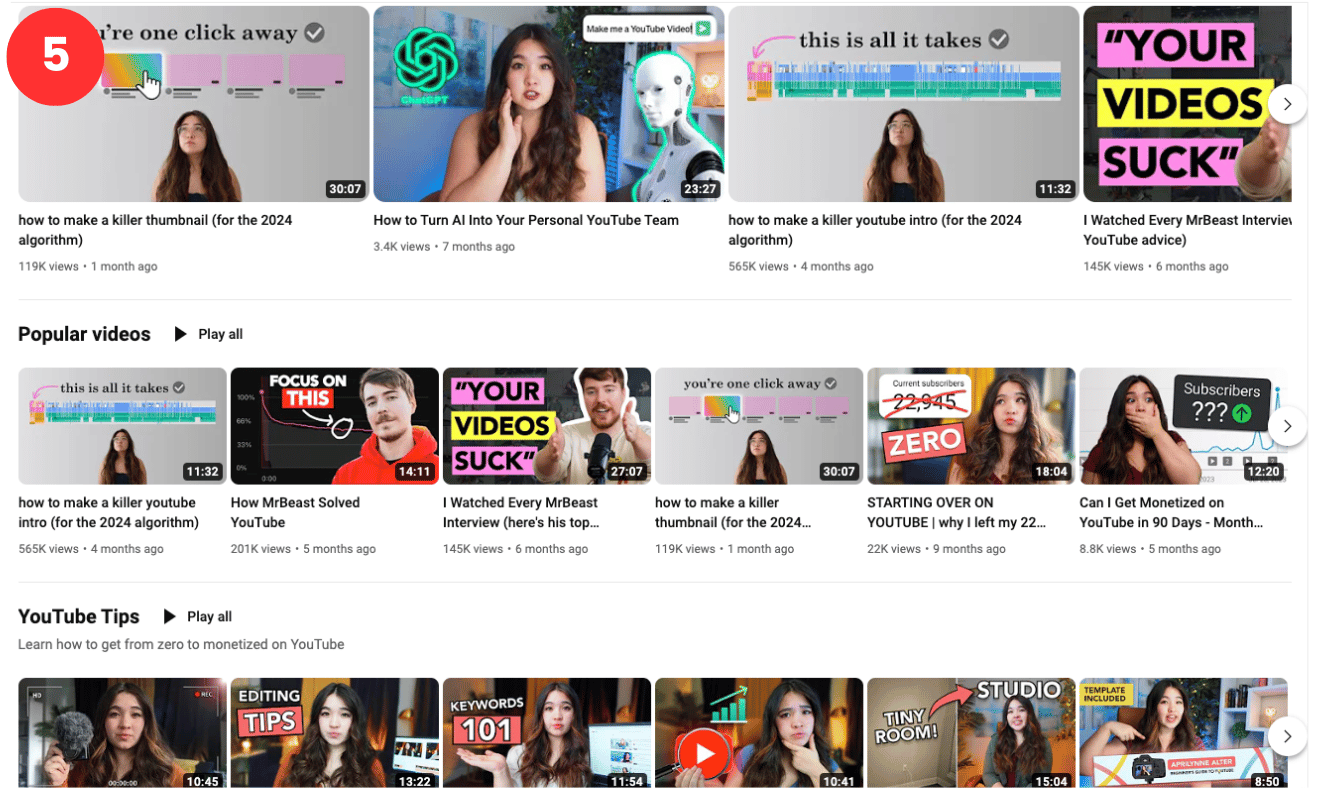
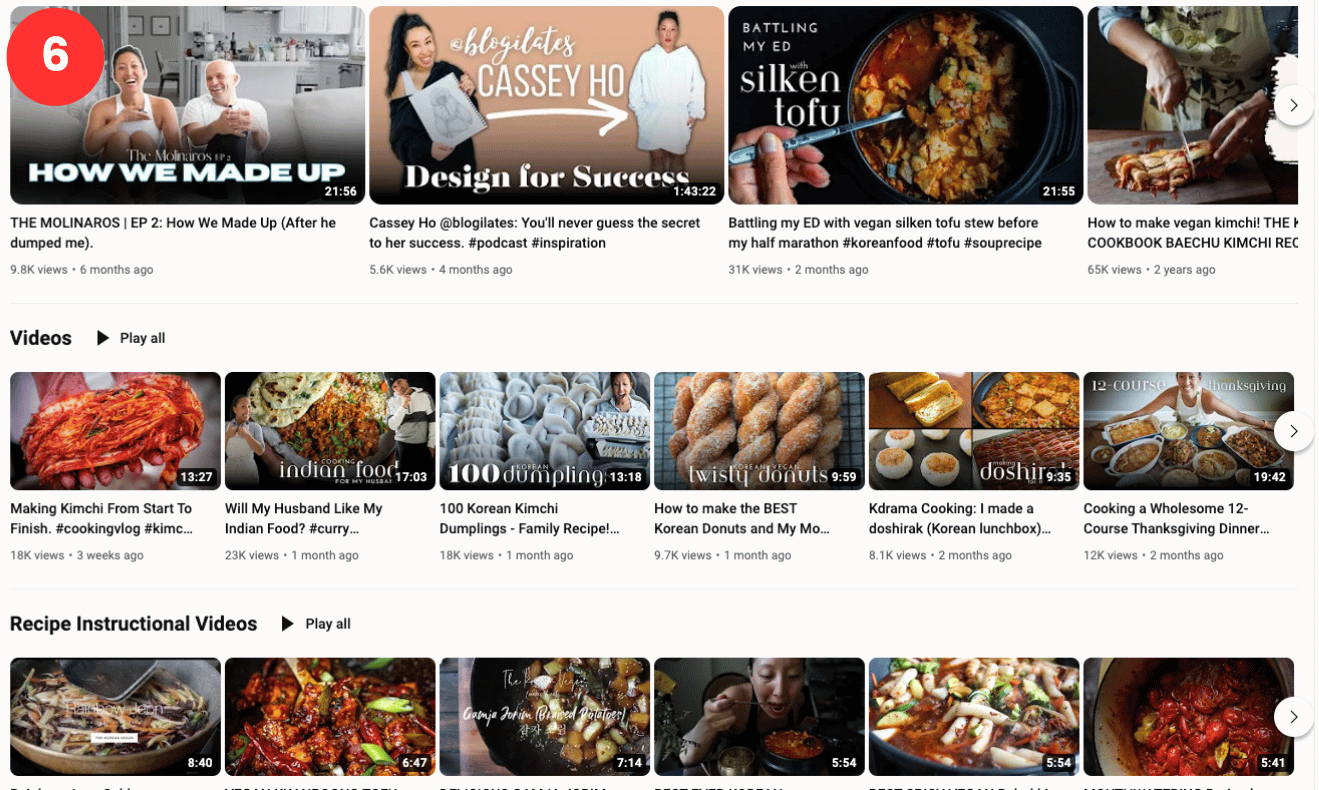
5. Jump right into the content
“Hello, my name is X, and I live in Y, and in this video, I’m going to…”
Three seconds in, and you’ve already lost them. Gone are the days of lengthy, chatty video intros in which you’re able to really contextualize and justify everything before you get into the meat of your content.
With the skyrocketing popularity of short-form video (thanks, TikTok), where there’s just no time for scene-setting, viewers are used to getting their value right upfront.
While YouTube allows for longer-form videos, you might think that getting to the point fast is not as important, but I’d argue that it’s even more so. In fact, watch time is a crucial metric when it comes to the YouTube algorithm. If viewers drop off your video within a few seconds, this sends a strong message to the ranking system that the content is not worth watching.
YouTuber Dr. Izzy Saeley calls the first 30 seconds of the video “the hook,” rating its importance second to only the thumbnail and title. “This is where you need to show the viewer that the video they’ve clicked on is actually the video they want to watch. It either has the value, or the entertainment, or the interest upfront.”
Izzy’s approach is to create what she calls a “curiosity gap” with the video title, thumbnail, and hook. “It raises some kind of question in the viewer’s mind, and they’re like, ‘Oh, I wonder what the answer to that is.’” The rest of your video, of course, should deliver the answer.
Here’s a great example of hers:
MrBeast, the most-followed YouTuber in the world with an eyewatering 235 million subscribers, usually prefers to jump straight into the action. This clip, which starts with speedy drone footage of him standing on the shores of a $250 million private island, complete with a Ferris wheel, roller coasters, and hot air balloons in the background, is the perfect example:
Of course, we don’t all have an army of drones and private islands at our disposal. Another tried-and-tested tactic here could be to start your clip with a high-value or funny moment that happens right in the middle of your clip. Dude Perfect’s channel features plenty of examples of the latter.
For best results, share a peek of that key moment, then cut to a to-the-point video intro.
6. Get creative with your edits
No matter how fascinating or funny your content is, no one wants to watch a talking head for ten minutes. But how do you keep your users engaged in long-form videos when they’re used to the fast-paced scroll of TkTok? Enter: pattern interrupts.
Pattern interrupts are a technique in neuro-linguistic programming for breaking a person’s habits or state. The term is often used in sales and marketing — and now, YouTube content creation — to refer to an unexpected action that shocks an audience out of autopilot.
Don’t let this intimidate you. Crazy Casey Neistat-style jump cuts are far from the only way to do this (though his videos are a great, albeit extreme, example of this.)
All this technique requires is some interesting visual elements to keep your viewers entertained as they absorb your content. B-roll (behind-the-scenes footage) or stock photos and videos work great here. You could also use transitions, animations, stickers, or typography to a similar effect. Whatever you use, don’t forget to make sure you squeeze in some of these interesting visual moments within the first 30 seconds, too.
Izzy’s videos are brilliant examples of subtle pattern interrupts and clever edits (and how to front-load them in that all-important hook).
Let’s relook at the example above. From the one-second mark, typography flashes in the frame to emphasize what Izzy’s saying. Three seconds later, her voiceover continues over B-roll footage of Izzy typing at her laptop, working out, and scrolling on her phone in bed. After that, she adds typography and zooms in on her face slightly to punctuate her point. All these transitions are ushered in with unobtrusive sound effects.
She eases off the edits slightly as she gets into the video, but they occur every couple of seconds, making her video — which is almost exclusively of her talking to the camera — exciting and visually engaging.
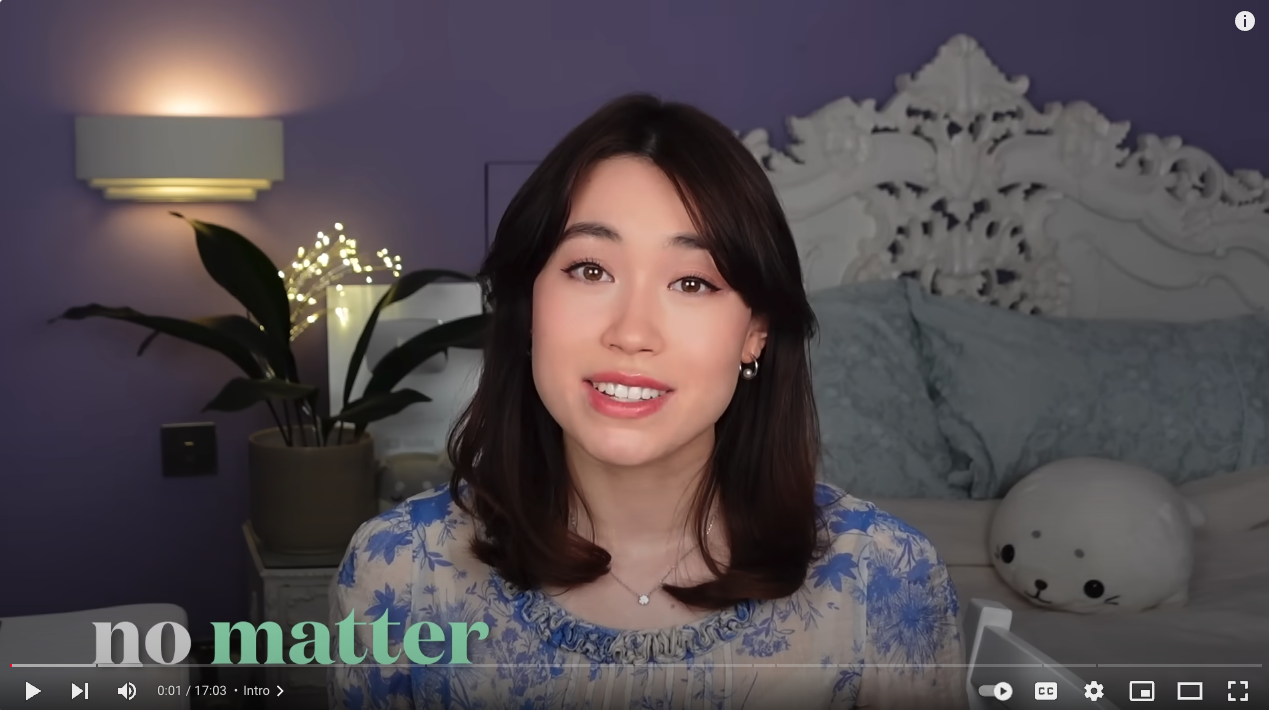
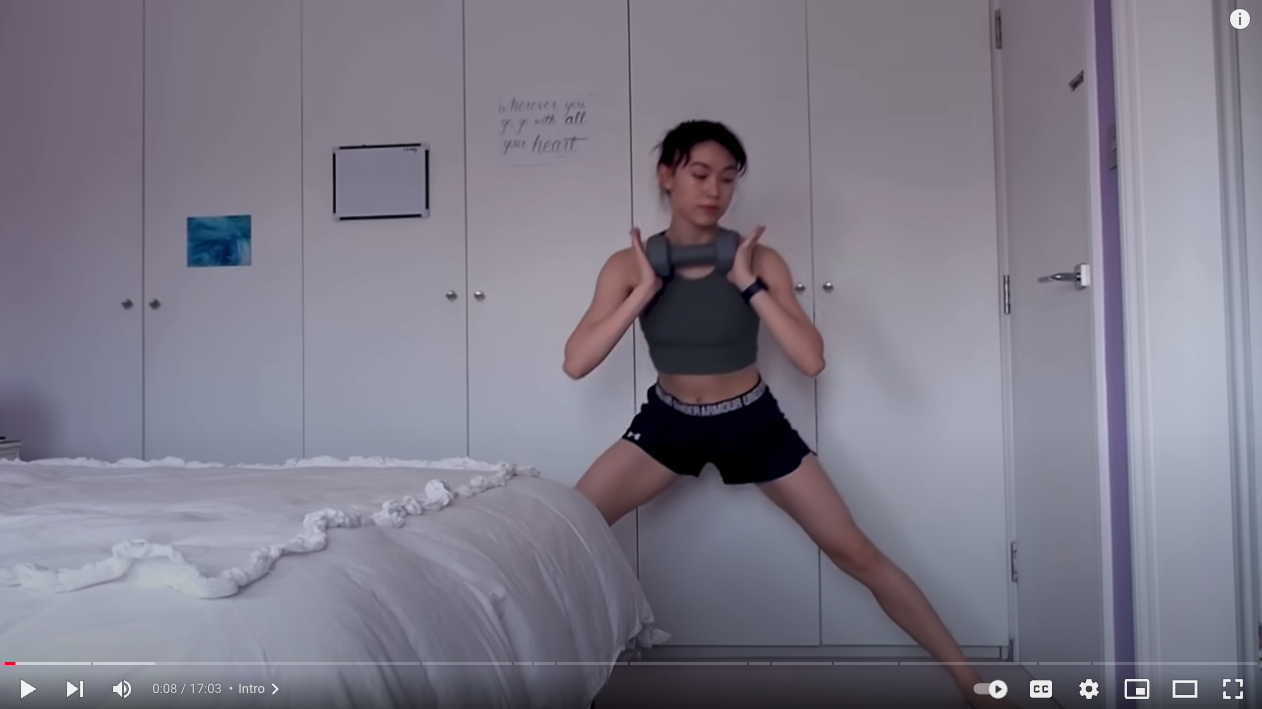
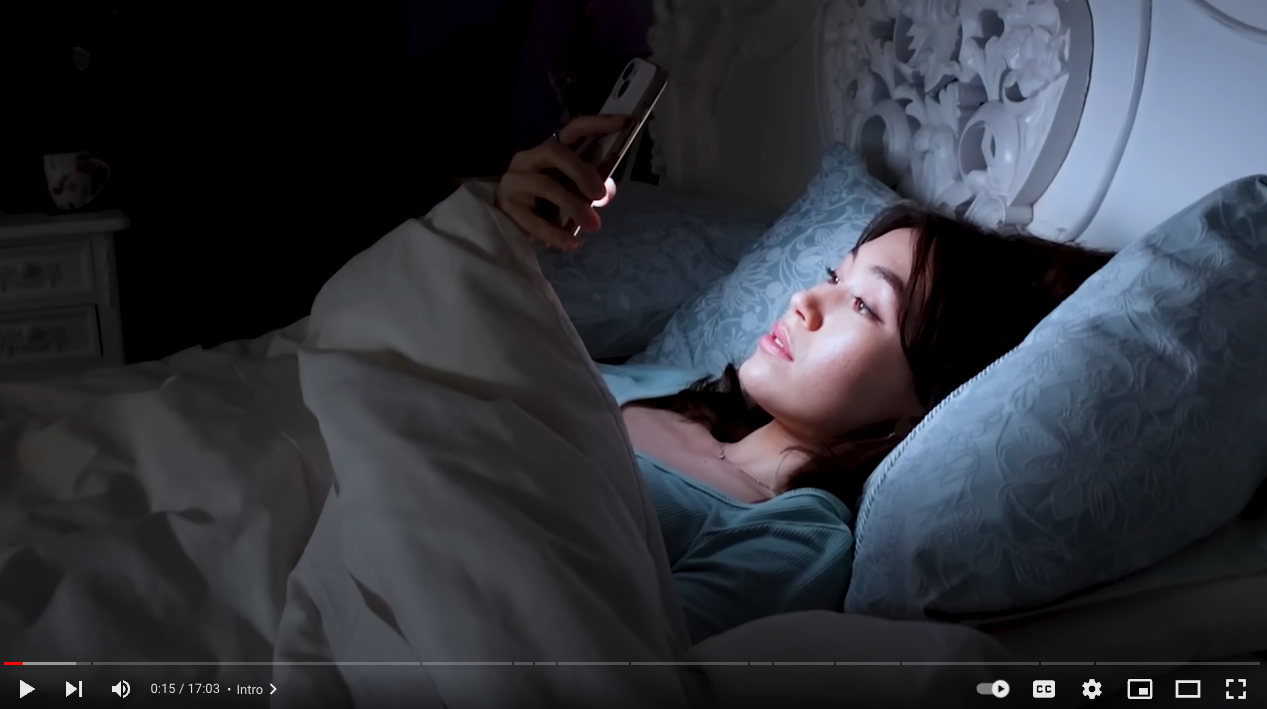
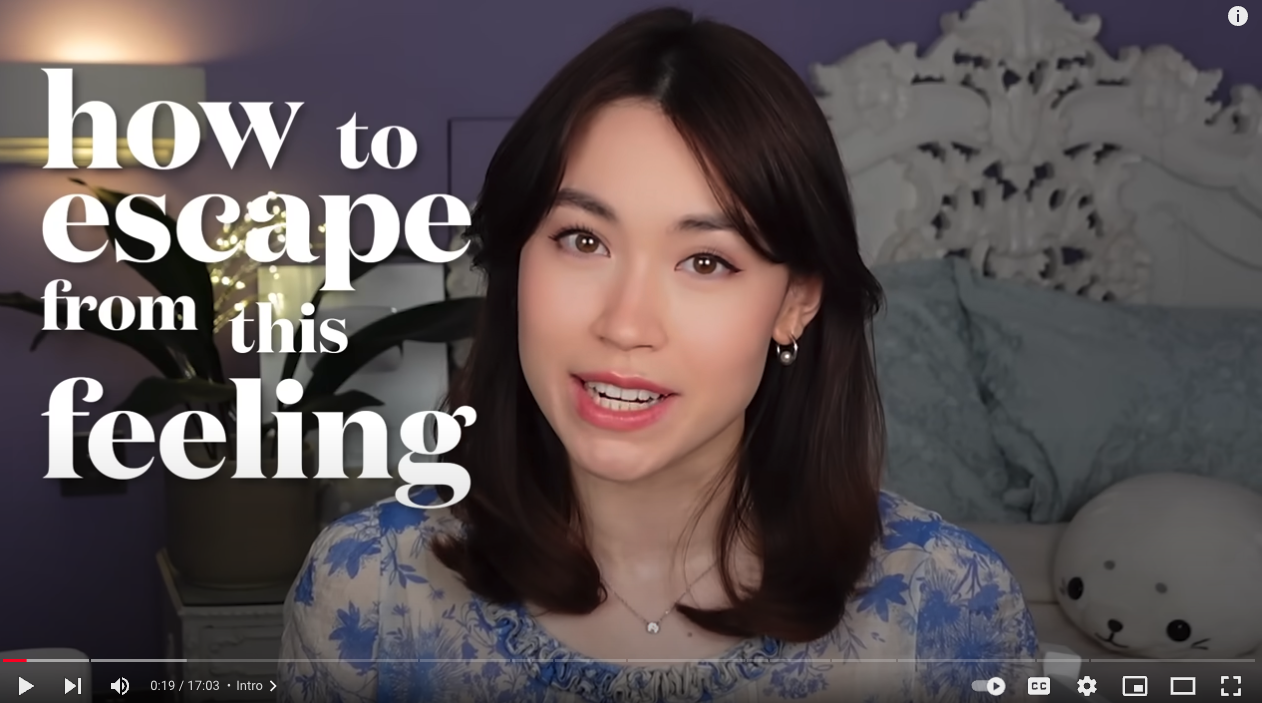
7. Start a series
Give your viewers a reason to keep coming back. Instead of loading all your value into a single, long video, why not break the content into shorter chunks you can turn into a series?
Alternatively, if you find something your target audience loves and wants more of, build that out into a series. There are few better examples of this than Adriene Mishler’s Yoga with Adriene channel.
She hit the nail on the head by releasing follow-along yoga flows of varying lengths in 2012 but took this to a whole new level with her 30-day journeys. Instead of one-off, standalone videos (which she still creates), she devotes most of her time to creating classes that drop at the same time every day for a month. In January 2024, she started a series called Flow — and the first class in the series already has 1.5 million views.
8. Lean into Shorts
Now averaging a whopping 70 billion views per day, creators would be remiss to ignore the growing power of YouTube Shorts. The portrait-style clips are a maximum of 60 seconds, and YouTube’s answer to TikTok and Instagram Reels.
Some YouTube Shorts Creators got their start with short-form clips and graduated to making longer videos, while others have stuck to making one-minute content exclusively. (It’s proved a great route to monetization through YouTube’s Partner Program, too).
With a YouTube Shorts Feed dedicated to the clips that work a lot like TikTok’s For You Page (FYP) or Instagram’s Explore page, Shorts can be a great way for new subscribers to discover your content.
If long-form videos are your comfort zone and you’re not sure where to start with Shorts, the best option could be to simply chop up key moments from your longer videos. Here’s a great example of how The Sorry Girls repurposed this 28-minute video of a living room makeover yielded into six different Shorts (with a combined 340K views).
Still stumped? Check out these 15+ YouTube Shorts Ideas For Your Next Video
9. Create a content system
If you’re serious about growing your YouTube channel, you need to think in systems, Ali Abdaal advises. “Instead of thinking, ‘What video can I make today?’, ‘What video can I make tomorrow?’ think, ‘What is the system I can build that would make the process of making every subsequent video way easier than it currently is?’”
Ali has a content library in Notion where he tracks the status of each video, thumbnail, title ideas, and more. Systems like this become increasingly important if you’re promoting your YouTube content on other social media platforms, too.
At Buffer, our content team uses a content calendar system to similar effect for all our social media channels, including YouTube. Here’s a look at our exact content calendar (+ a template) and a thorough guide to building a content calendar from scratch.
10. Think community not audience
Engaging and interacting meaningfully with your audience is now table-stakes advice for social media growth, but no less important for it. Think about it: what better way to keep users coming back to and supporting your content than building authentic relationships with them?
YouTube actively encourages creators to do this if they’re looking to grow. “The more you engage with your audience, the more they'll engage with you. Talking to viewers and responding to their feedback is key to growing your channel.”
This is best done by responding to and hearting as many comments as possible on your videos (easily managed through YouTube Studio’s Comments tab).
On their Creators Channel, YouTube partnered with creators Colin and Samir to get tips on how YouTubers can build community on the platform with a few other tactics. Their guidance was simple but effective:
Screenshot user comments and use them in videos
“We plan for the comments even when we’re writing our scripts and coming up with the ideas for our videos,” Colin says. This is a great way to address questions straight from your audience or just show your channel subscribers your appreciation.
Gaming creator Fantayzia is another YouTuber who uses this tactic successfully — she includes a fan shoutout from a recent video in all her latest content, offering her viewers a moment in the spotlight where she talks to them directly.
Start conversations within your videos
YouTube is not just a conversation between you and your audience, it’s a conversation between your audience, Samir says. “When we upload a video, we see it as opening the doors to a convention hall,” he adds.
This is why, in much of their content, you’ll find questions to prompt the audience to share their opinions and start discussions in the comments section. “It offers the opportunity for our audience to turn into a self-sustaining community,” Samir says.
Set the tone with a pinned comment
Comments sections can be difficult to moderate, especially as your channel grows. This is why Colin and Samir have taken to pinning a thoughtful comment from a viewer to the top of some of their videos, to give future commenters a signal of what kind of comments are expected.
11. Look beyond views and subscribers
While the video views and subscriber count might feel like the be-all and end-all, they’re not the whole story. YouTube Studio’s Analytics tab offers a wealth of metrics to tell you how well your content is performing beyond total video views and number of subscribers.
Within the Overview section, you’ll get a birds-eye view of how your videos are performing over a recent period compared to the previous one.
Under Content, you’ll get a closer look at how your regular videos, Shorts, and Lives are performing. Here, you’ll find fascinating metrics like:
- Key moments for audience retention on your videos
- Where users discover your videos or Shorts
- At what point in the video the majority dropped off
Audience is particularly helpful. It gives you a look at how many returning viewers you have, plus the specific videos that are helping to grow your channel (really useful if you’re stuck on number two in this list).
While all the numbers are exciting, they can be overwhelming: focus on making changes based on one or two metrics at a time and monitoring their success.
12. Stick with it!
Don’t expect stellar results right out of the gate.
No matter what level your content creation skills are at when you first start your YouTube Channel, you can expect the first few videos to flop — which, Ali Abdaal, says in this great video, is enormously freeing.
“You don’t need to overthink it. No one is going to watch the first several videos anyway. You have to start off by being bad, and over time, by being bad repeatedly, you will eventually be good at making videos,” he says.
“Your videos will start to add value, you’ll start to figure out what your niche is… your channel will grow, and then at some point, you will be a millionaire and then life will be all great.”
An overly optimistic outlook, perhaps, but I’ll leave you with that.
Source: Global Media Insight
Try Buffer for free
190,000+ creators, small businesses, and marketers use Buffer to grow their audiences every month.




